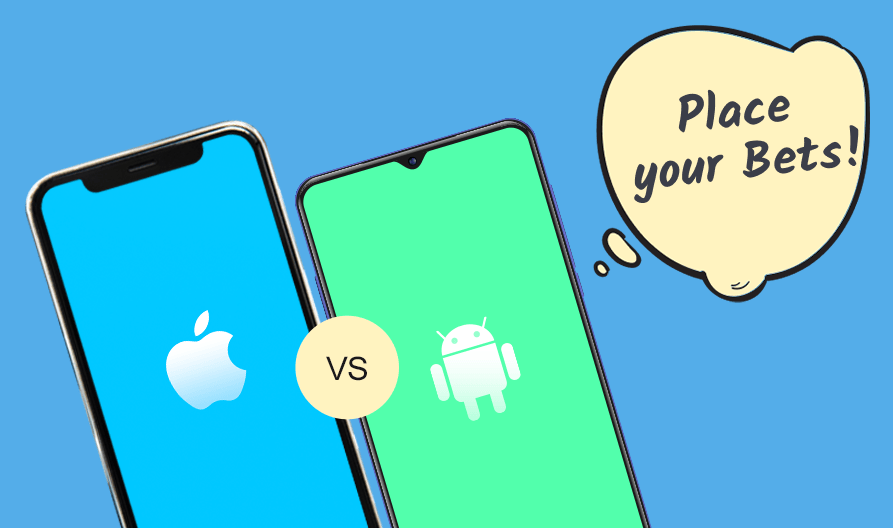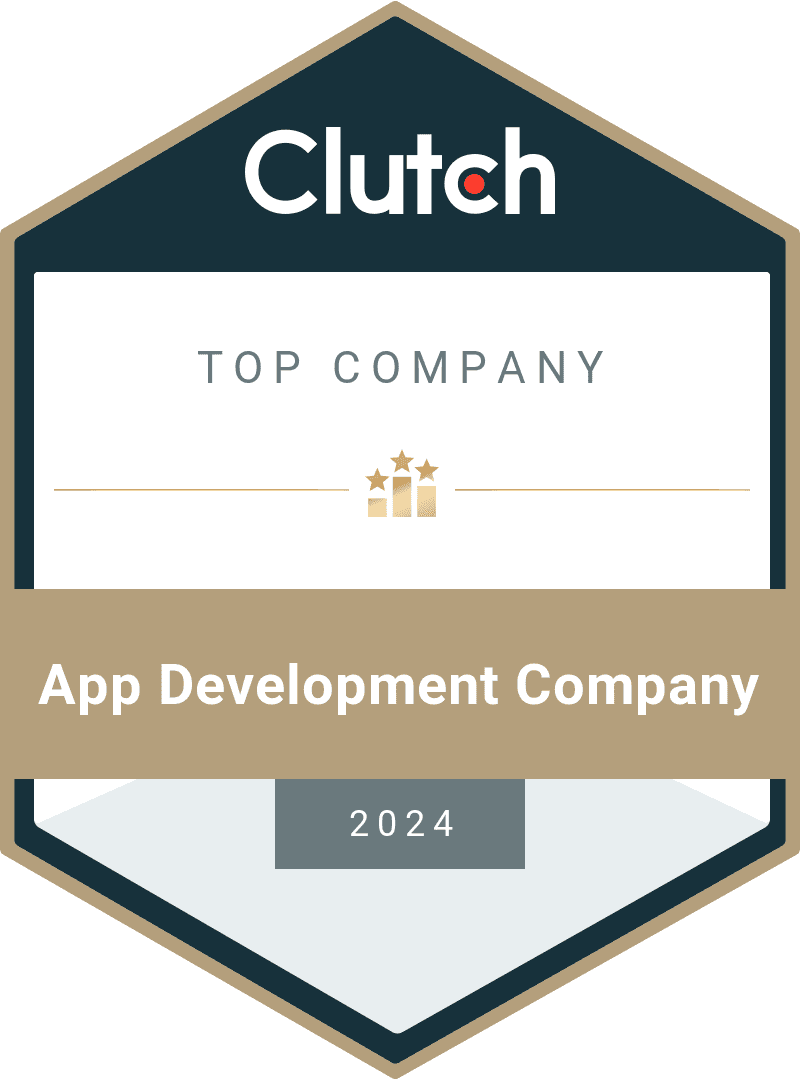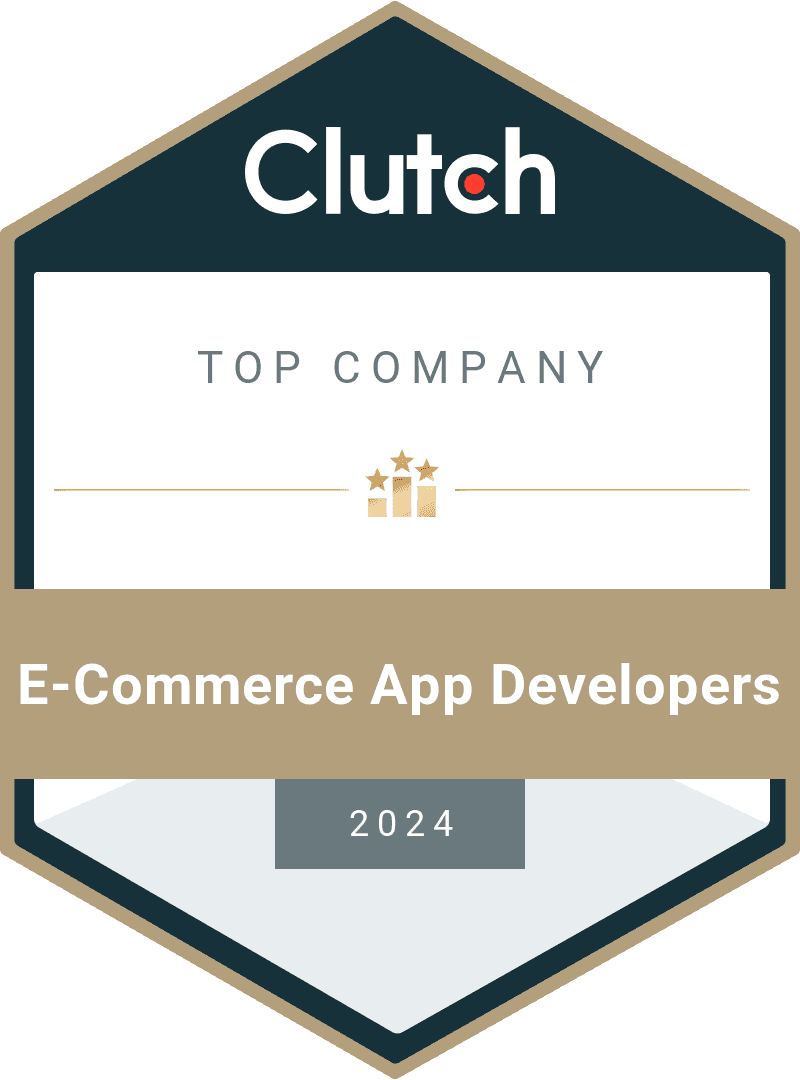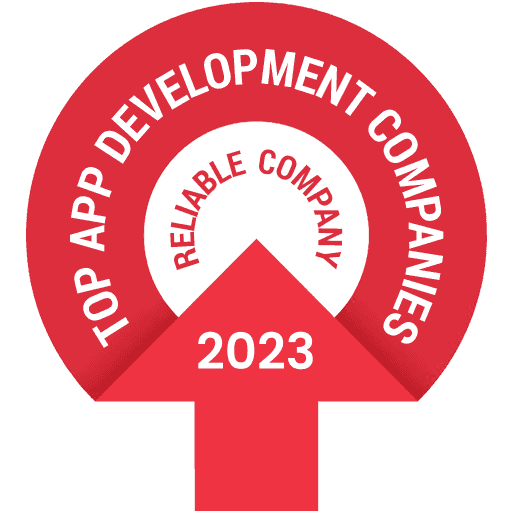In the realm of mobile app development, two giants dominate the market: iOS and Android.
These two operating systems offer unique features, development frameworks, and user experiences.
Understanding the differences in the subject of iOS vs Android app development is vital for businesses and developers aiming to create successful mobile applications.
In this article, we will provide a quick comparison based on our experience of iOS and Android app development, highlighting their main differences.
We will explore aspects such as programming languages, development tools, market share, design guidelines, and target audience considerations.
By grasping the distinctions between iOS and Android app development, readers will gain insights to make informed decisions about platform selection and tailor their development strategies accordingly.
Android vs iOS App Development: What’s the Difference?
According to our experience of 16 years on the market, we want to share the key differences between Android and iOS app development, focusing on aspects such as programming languages, integrated development environments (IDEs), design approaches, development complexities, cost considerations, and potential return on investment.
By diving into these areas, readers will gain a comprehensive understanding of the nuances and disparities between Android and iOS development.
Whether you're a developer choosing a platform or a business owner planning your app strategy, this comparison will equip you with the insights needed to make informed decisions and maximize your app's success.
Let's delve into the world of Android vs iOS app development and discover what sets them apart.

Programming Language
The main iOS programming languages used in this type of development are Swift and Objective-C. Swift, introduced by Apple, has quickly gained popularity among developers due to its modern syntax and enhanced performance.
It offers numerous features that enhance developer productivity and code readability.
On the other hand, Objective-C has been used in iOS development for many years and is still employed for maintaining existing codebases.
The primary Android programming language is Java. Java has long been the traditional language for Android app development, offering a vast array of libraries, frameworks, and tools for building robust applications.
However, with the endorsement of Kotlin by Google, Kotlin has gained traction as an alternative language for Android development.
Kotlin provides concise syntax, improved null safety, and seamless interoperability with Java, making it an attractive choice for developers.
Many developers have acquired proficiency in these programming languages as they are widely taught and have extensive learning resources available.
Reputable websites and developer surveys offer insights into the proficiency and preferences of developers in these languages.
By referring to these sources, it is possible to obtain valuable information about the skill sets and trends within the iOS and Android developer communities.
IDE (Integrated Development Environment)
There are key differences in the Integrated Development Environments (IDEs) used for iOS and Android app development, as well as the app development tools associated with each platform.
For iOS development, the primary IDE is Xcode. Xcode is an all-in-one development environment designed specifically for iOS and macOS app development.
It includes a suite of tools, such as the Interface Builder for designing app interfaces, the iOS Simulator for testing apps, and the Instruments tool for performance analysis.
Xcode also provides extensive debugging capabilities and supports multiple programming languages, including Swift and Objective-C.
On the other hand, Android development primarily utilizes Android Studio as the IDE.
Android Studio is based on JetBrains' IntelliJ IDEA and offers a comprehensive set of tools for Android app development.
It features a layout editor for designing app interfaces, an emulator for testing apps on virtual devices, and a robust code editor with intelligent code completion and refactoring tools.
Android Studio also integrates with the Android SDK, enabling access to various libraries, APIs, and debugging utilities.
In terms of app development tools, iOS developers rely on tools like CocoaPods and Carthage for dependency management and third-party library integration.
Additionally, Apple's TestFlight is used for beta testing and app distribution. Android developers, on the other hand, utilize tools like Gradle for build automation, Android Debug Bridge (ADB) for device communication and debugging, and Google Play Console for app publishing and distribution.
Overall, the difference between Android and iOS is while Xcode is the primary IDE for iOS development, and Android Studio is the go-to IDE for Android development, both platforms offer a range of app development tools that facilitate the creation of high-quality mobile applications.
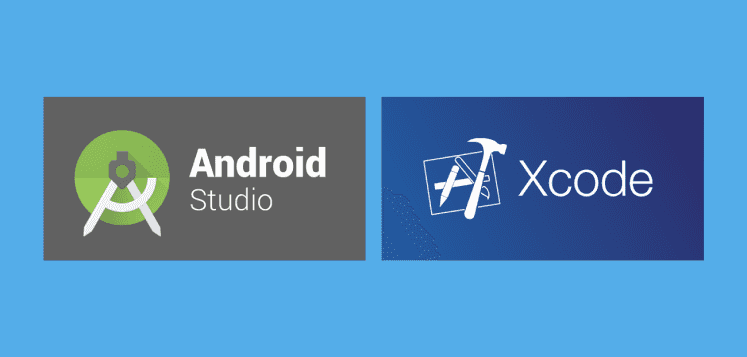
Differences in design
While writing about the key differences for iOS vs Android design of applications, it is important to note that Android apps are generally more complex to develop than their iOS counterparts.
The main underlying reason for this is device fragmentation.
When it comes to design, iOS and Android have distinct design guidelines and principles that developers should follow to ensure consistency and a native look and feel.
In terms of visual design, iOS applications often feature a more sleek and minimalist design aesthetic, with a focus on clarity, typography, and smooth animations.
The iOS design language, known as Human Interface Guidelines (HIG), emphasizes simplicity and elegance.
On the other hand, Android applications embrace a more customizable and flexible design approach. Android apps can have varied visual styles and layouts, allowing for greater creativity and customization.
The Android design language, known as Material Design, focuses on a clean and modern interface, with the use of depth, shadows, and vibrant colors.
Additionally, device fragmentation in the Android ecosystem poses a challenge for designers.
Android devices come in various screen sizes, resolutions, and aspect ratios, which requires designers to create adaptable layouts and consider different device capabilities.
In contrast, iOS has a more controlled hardware and software ecosystem, resulting in a more consistent user experience across devices.
Complexity of development
While writing about the key differences in the complexity of iOS vs Android app development, we decided that it is important to mention the presence of Apple's Design and Development Guidelines and App Store Guidelines for iOS.
For iOS development, Apple provides comprehensive guidelines known as Apple's Design and Development Guidelines.
These guidelines outline the best practices, UI elements, and interactions that developers should follow to create visually appealing and intuitive iOS applications.
Additionally, App Store Guidelines provide instructions on the technical and content requirements for submitting apps to the App Store.
Regarding Android development, there are similar guidelines and resources available.
Google provides the Material Design guidelines, which offer design principles, UI components, and patterns for creating Android applications with a consistent and visually appealing user interface.
These guidelines help developers maintain a cohesive look and feel across different Android devices.
However, it's worth noting that adhering to these guidelines may vary in terms of difficulty during the development process.
While Apple's guidelines are generally considered strict and closely followed by iOS developers, adhering to Android's guidelines can be more flexible.
Android offers more customization options and allows developers to tailor the app's appearance to a greater extent.
This flexibility can make it slightly more challenging to ensure a consistent user experience across various Android devices.
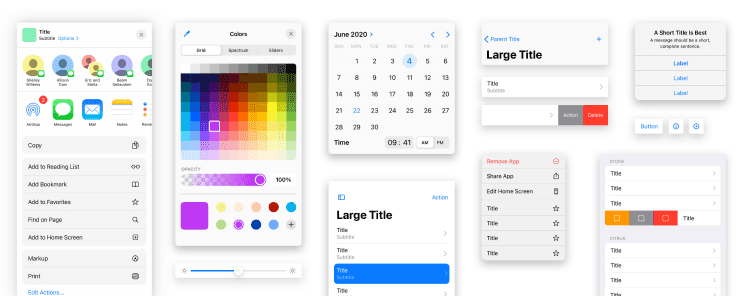
Cost of development
When embarking on an app development journey and choosing iOS vs Android, one of the crucial considerations is the cost involved.
Understanding the price range and difference between iOS and Android development can help you plan your budget effectively and make informed decisions.
Here, we will explore the minimum and average costs associated with developing a good application based on our experience for both platforms.
Minimum Cost:
The minimum cost for developing an iOS or Android app can vary based on various factors such as app complexity, features, design, and development resources.
On average, the minimum cost for a simple app with basic functionality can range from $5,000 to $10,000. This estimate covers the essential features and a basic user interface.
Average Cost:
The average cost for developing a robust and feature-rich app on iOS and Android platforms typically ranges from $20,000 to $100,000.
This price range encompasses medium to high complexity apps with advanced features, custom designs, integration with third-party APIs, backend development, and extensive testing.
It's important to note that these cost estimates are approximate and can vary depending on various factors specific to your project.
Factors such as the complexity of features, design intricacy, backend infrastructure, and the need for ongoing maintenance and updates can significantly impact the overall cost.
By understanding the cost range for iOS and Android app development, you can better assess your project's financial requirements and make informed decisions about resource allocation.
We have a more detailed explanation of the cost of iOS and Android app development in our article here.
Return on investment
Developing an iOS or Android app involves not only the upfront cost but also the potential return on investment (ROI) it can generate for your business.
Evaluating the ROI of iOS and Android app development is essential to gauge the value and benefits your app can offer.
Let's explore the potential ROI and real-life examples of successful apps on both platforms.
Revenue Generation:
Mobile apps can generate revenue through various monetization strategies like in-app purchases, subscriptions, advertisements, and paid downloads.
For instance, the popular mobile game "Candy Crush Saga" has amassed millions of dollars through in-app purchases, demonstrating the revenue potential of well-designed and engaging apps.
Enhanced Customer Engagement:
Apps provide a direct and personalized channel to engage with customers, leading to improved customer loyalty, enhanced brand recognition, and a seamless user experience.
Consider the Starbucks mobile app, which allows customers to order and pay for drinks, collect rewards, and locate nearby stores.
This convenience and personalized experience contribute to increased customer engagement and repeat business.
Streamlined Business Processes:
Apps can streamline internal business processes, leading to increased efficiency and cost savings.
Salesforce's mobile app, for example, offers a comprehensive CRM solution on the go, empowering sales teams to manage customer interactions, track leads, and close deals more efficiently.
Competitive Advantage:
A well-designed and functional app can provide your business with a competitive edge, attracting new customers, differentiating your brand from competitors, and demonstrating a commitment to innovation.
Uber is a prime example. Their intuitive and user-friendly app disrupted the traditional taxi industry by offering a convenient and seamless ride-hailing experience.
To maximize ROI in iOS or Android app development, focus on user experience, target the right audience, and iterate based on user feedback and market trends.
Conduct market research, analyze your target audience's needs, and consider potential revenue streams to align your app development efforts with your business goals.
Remember, the actual ROI will depend on factors like app quality, marketing efforts, user adoption, and ongoing updates.
Collaborating with experienced app developers like us and leveraging data-driven insights can help optimize your app's performance and drive a higher return on your investment.
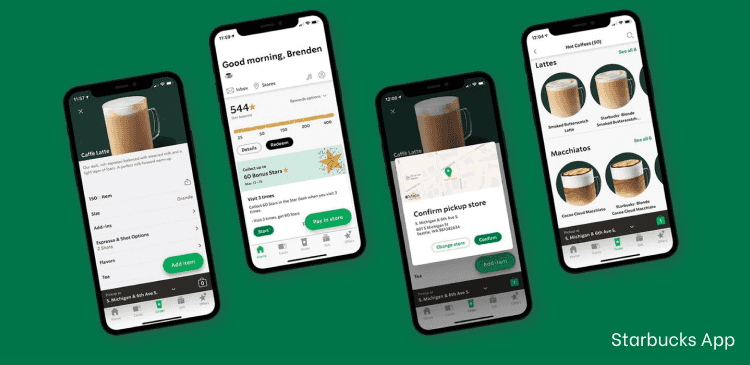
Android vs iOS app development
We want to share some of our own experience and provide comprehensive comparison charts highlighting the key advantages and drawbacks of Android and iOS app development.
By examining factors such as market share, user demographics, development complexity, monetization options, and more, you can gain valuable insights that will help you choose the platform that aligns best with your app's objectives and target audience.
Whether you're a business owner, an entrepreneur, or a developer, these comparison charts will serve as a valuable resource to navigate the Android vs iOS dilemma and make an informed decision for your app development journey.
iOS vs Android Development Comparison: Benefits
Benefits of Android App Development
Android app development offers a range of benefits that make it an attractive choice for businesses and developers alike.
Based on our experience we will share the key advantages of Android app development and why it has become such a popular platform for mobile applications.
- Wide Market Reach: Android boasts the largest market share globally, giving developers access to a vast user base. By targeting Android, businesses can reach a broader audience and tap into diverse markets.
- Open Source Platform: Android is an open-source platform, which means developers have more flexibility and freedom to customize and modify the operating system according to their requirements. It provides extensive development tools and resources, making it easier to create innovative and feature-rich applications.
- Lower Development Costs: Android app development often incurs lower costs compared to other platforms. The Android SDK (Software Development Kit) is freely available, reducing the upfront investment. Additionally, the Google Play Store has a one-time registration fee, which is relatively affordable.
- Seamless Integration: Android apps can seamlessly integrate with various Google services and products, such as Google Maps, Google Drive, and Google Analytics. This integration allows developers to leverage powerful APIs and deliver enhanced functionalities to users.
- Diverse Hardware Options: Android supports a wide range of devices, from smartphones and tablets to smart TVs and wearables. This diversity of hardware options gives developers the opportunity to create applications that cater to different screen sizes, resolutions, and device capabilities.
By harnessing the benefits of Android app development, businesses can reach a broader audience, enjoy cost efficiencies, and create innovative applications that leverage the power of the Android platform.
Benefits of iOS App Development
iOS app development offers a multitude of benefits that make it an attractive platform for businesses and developers.
Based on our experience we will share the key advantages of iOS app development and why it is favored by many in the industry.
- High-Quality User Experience: iOS devices are renowned for their seamless user experience and intuitive interface. Apple places great emphasis on design and usability, resulting in apps that are visually appealing, responsive, and deliver a superior user experience.
- Strong Security and Privacy Measures: Apple's stringent app review process and robust security measures make iOS a trusted platform for sensitive applications. The platform provides built-in security features such as data encryption, secure authentication, and app sandboxing, ensuring the protection of user data and privacy.
- Fragmentation-Free Environment: Unlike the Android platform, iOS devices have a limited number of models and operating system versions. This leads to less fragmentation, making it easier for developers to design, develop, and test applications across a more consistent and controlled environment.
- Higher Monetization Potential: iOS users are generally more willing to pay for apps and in-app purchases, making the platform conducive to generating higher revenues. The App Store ecosystem offers a well-established marketplace where developers can effectively monetize their applications.
- Swift Programming Language: iOS app development utilizes Swift, a powerful and modern programming language that enhances developer productivity and code readability. With Swift, developers can build robust, efficient, and maintainable applications while enjoying the support of a vibrant developer community.
By harnessing the benefits of iOS app development, businesses can deliver a premium user experience, prioritize security, and tap into a platform known for its user engagement and revenue potential.
iOS offers a strong ecosystem for developers to create innovative and successful applications that cater to a loyal user base.
iOS vs Android Development Comparison: Cons
Cons of Android App Development
While Android app development has its merits, it's important to also consider the potential challenges and drawbacks that developers may encounter.
In this section, we will explore some of the cons associated with Android app development.
- Fragmentation and Device Diversity: One of the biggest challenges in Android app development is the fragmentation of the platform. There is a wide range of Android devices with different screen sizes, hardware capabilities, and operating system versions. This can make it challenging to ensure consistent app performance and compatibility across all devices.
- Longer Development and Testing Cycles: Due to the fragmentation mentioned above, developers need to invest more time in testing and optimizing their apps for various devices. This can lead to longer development cycles, increased costs, and more resources needed to ensure app stability and compatibility.
- Security Concerns: Android's open-source nature, while providing flexibility and customization options, can also make it more vulnerable to security risks. With a larger user base and various app marketplaces, the risk of malware, security breaches, and data theft is relatively higher compared to the closed ecosystem of iOS.
- App Store Approval Process: Unlike the streamlined app review process of the iOS App Store, getting an app approved on the Google Play Store can sometimes be more challenging. Google's review process is less stringent, which can result in a larger number of low-quality or potentially harmful apps on the marketplace.
- Monetization Challenges: While the Android platform has a larger market share globally, it can be more difficult to monetize apps compared to iOS. Android users are generally less willing to pay for apps, which means developers may need to rely more on in-app advertisements, freemium models, or alternative revenue streams.
Despite these challenges, Android app development offers vast opportunities, a wider user base, and the ability to customize and innovate.
By carefully considering these cons and implementing effective development strategies, developers can overcome these challenges and build successful Android applications.

Cons of iOS App Development
While iOS app development has many advantages, it's essential to acknowledge the potential drawbacks and challenges associated with building apps for the iOS platform.
In this section, we will explore some of the cons of iOS app development.
- Limited Device and OS Fragmentation: While the limited device and operating system fragmentation of iOS can be seen as an advantage, it also means developers must adhere to strict guidelines and design principles set by Apple. This can sometimes limit the flexibility and creativity in app design compared to the more open nature of Android.
- Longer App Approval Process: The app review process for iOS apps can be more time-consuming and stringent compared to other platforms. Apple maintains strict quality control, which can result in longer wait times for app approval. This can delay app launches and updates, affecting development timelines and time-to-market.
- Cost of App Development: Developing apps for iOS can be more expensive compared to other platforms. This is mainly due to the need for specialized hardware (Mac computers) and software tools (Xcode) required for iOS app development. Additionally, the cost of acquiring an Apple Developer Program membership and compliance with Apple's guidelines can add to the overall expenses.
- Limited Customization and Integration Options: iOS has a closed ecosystem, which limits the level of customization and integration options available to developers. The operating system's strict guidelines and restrictions may pose challenges when integrating with third-party services or implementing certain functionalities.
- Market Share and User Base: While iOS boasts a loyal and affluent user base, its market share is smaller compared to Android globally. This can impact the reach and potential user base for iOS apps. Developers targeting a broader audience or certain geographical regions may need to consider the market share implications.
Despite these challenges, iOS app development offers benefits such as higher app revenue potential, user engagement, and a reputation for quality.
By understanding and working within the limitations of the iOS platform, developers can create exceptional apps that cater to the preferences and expectations of iOS users.
iOS vs Android Development Comparison: which one is better?
When considering the comparison between iOS vs Android app development, it's important to focus on choosing the platform that aligns with your specific goals and target audience.
However, there is always an alternative - developing cross-platform apps that can cater to both iOS and Android users.
Developing for iOS offers a seamless user experience, higher revenue potential from the app store, and a reputation for quality and security.
It appeals to users who appreciate a cohesive interface and access to curated app ecosystems.
On the other hand, Android development offers a larger market potential, diverse device options, and greater flexibility in customization.
It caters to developers seeking a more open ecosystem and the ability to reach a broader user base.
However, there is always the option of cross-platform app development, which can satisfy users on both iOS and Android.
This solution allows you to maximize audience reach and provide a unified codebase for different platforms.
Developing cross-platform apps can be an efficient choice if you need to ensure broad compatibility and widespread adoption across various mobile platforms.
In the end, the choice between iOS and Android development should align with your specific goals and project priorities.
Consider factors such as the demographic characteristics of your target audience, market potential, available development resources, and budget constraints.
It's also worth exploring the possibility of leveraging cross-platform frameworks and tools to streamline development and maximize your app's impact across multiple platforms.
Relevant Articles:

